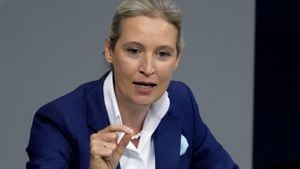The United States has made a significant move at the United Nations by proposing its own resolution to mark the third anniversary of the war between Russia and Ukraine. This proposal has stirred notable contention, particularly because it steps away from the urgencies being pushed by Kyiv and Europe, who are advocating for stronger actions against Russia.
On Saturday, US Secretary of State Marco Rubio described the American resolution as "simply historic" and urged all member states to support it as part of efforts to create pathways toward peace. Unlike the European draft supported by Ukraine, the US resolution does not condemn Russia as the aggressor nor does it recognize the territorial integrity of Ukraine.
Rubio’s comments indicate not only the American strategy but also reflect part of the broader political discourse initiated under President Donald Trump, who has previously criticized approaches to international conflicts involving stringent stances against Russia. The Secretary noted, “This resolution aligns with President Trump’s viewpoint on the need for the United Nations to return to its foundational purpose," referencing the requirements set out and aimed at maintaining international peace.
Behind the scenes, tensions have been palpable. Since the inception of the conflict, European nations have engaged with the United Nations to construct their own draft resolution, which emphasizes the immediate and unconditional withdrawal of Russian forces from Ukraine. Upcoming votes scheduled for Monday could put the US and European positions against each other, marking yet another fracturing moment in transatlantic relations.
According to Reuters, the US delivered its resolution draft to the Security Council late Friday. The nation aims to hold votes swiftly to gain traction before the General Assembly deliberates on Monday. Analysts indicate this urgency may stem from fears of Kyiv being sidelined as the US engages directly with Russia.
The language used within the US proposal, which expresses condolences for the "tragic loss of life" throughout the protracted conflict, has been both welcomed and critiqued. Rubio emphasized the importance of renewing diplomatic discussions, stating, "If the UN is genuinely committed to its original purpose, then it must recognize the prospect of lasting peace remains achievable." This statement echoes sentiments of maintaining diplomatic channels even as the cries for accountability grow louder.
Russia’s response to the American resolution has been mildly favorable; Vasily Nebenzya, the Russian ambassador to the UN, regarded the US move as "a good step". This reflection pointed toward Russia’s desire to add discussions of "root causes" for the conflict, aiming to shift some blame onto historical tensions rather than focusing purely on military aggression.
On the flip side, the Ukrainian leadership has reacted with vocal skepticism. President Volodymyr Zelensky criticized Trump’s remarks, which seemingly downplay the seriousness of Russian actions. Zelensky stated, "Trump lives in Russian disinformation space," firmly rejecting any peace proposals made without Ukraine's direct involvement. This highlights the tenuous position Ukraine finds itself as external powers negotiate on its behalf.
This diplomatic tug-of-war is emblematic of broader international dynamics at play. Europe, more often than not, has called for accountability and strict measures against Russian actions, which have led to substantial civilian casualties and geopolitical destabilization. Conversely, the US appears to be pursuing more lenient terms, reflecting Trump’s historical approach which prioritizes rapid peace negotiations over comprehensive solutions.
The conclusion to Saturday’s heated exchanges within the UN points toward the potential reconfiguration of diplomatic strategies surrounding the war and its aftermath. The upcoming votes will not only signal the stance of world leaders on Russia's aggression but also reflect their commitments to Ukraine’s sovereignty and rights.



